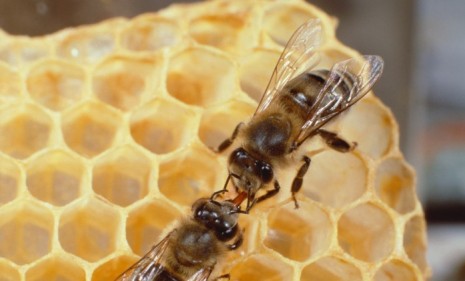The great honeybee die-off: Mystery solved?
Tens of billions of bees worldwide have seemingly vanished. Scientists may have figured out why — with a little help from the U.S. military

"One of the great murder mysteries of the garden" — the unprecedented die-off of American honeybees in recent years — may have been solved, says The New York Times. Since 2006, tens of billions of bees in the U.S. have vanished from their hives, and scientists have been unable to pinpoint why. But with help from the U.S. Army, a team of Montana researchers believe they have figured out what has been happening. (Watch a report about the honeybee die-off.) Here is a guide to what might be killing the bees and why it matters:
What do these researchers think caused the die-off?
Their theory is that the bees have been hit with a one-two punch — a fungus reacting with a virus. Both were detected in every dead colony the group studied. The researchers just are not sure yet how the fungus and virus work together to kill the bees. "They're co-factors, that's all we can say at the moment," said the study's lead researcher, Jerry Bromenshenk of the University of Montana in Missoula.
The Week
Escape your echo chamber. Get the facts behind the news, plus analysis from multiple perspectives.

Sign up for The Week's Free Newsletters
From our morning news briefing to a weekly Good News Newsletter, get the best of The Week delivered directly to your inbox.
From our morning news briefing to a weekly Good News Newsletter, get the best of The Week delivered directly to your inbox.
How did the Army get involved?
Using military software developed to detect biological threats to soldiers in the field, the Army's chemical biological experts were able to analyze proteins extracted from dead bees, and identify viruses and other microscopic life forms that shouldn't be there. This was probably the "first time that the defense machinery of the post-Sept. 11 Homeland Security Department and academia have teamed up to address a problem that both sides say they might never have solved on their own," says Kirk Johnson in The New York Times.
What did people believe was killing the bees before?
The die-off has been blamed on everything from global warming to overbreeding. More far-fetched suggestions, says The New York Times, included a "secret plot by Russia or Osama bin Laden to bring down American agriculture," or a supposed "rapture of the bees, in which God recalled them to heaven." The mystery even inspired a documentary, which blamed genetically modified pesticides for the bees' disappearance.
A free daily email with the biggest news stories of the day – and the best features from TheWeek.com
Did this study examine pesticides, too?
No — and some are suspicious about that. It has emerged that Bromenshenk previously received research grants from Bayer, the manufacturer of pesticides that some still blame for the diminishing colonies. The bee researcher denies any conflict of interest and says no Bayer funds were spent on this particular study. The study didn't look at pesticide use, he explained, because "others are funded to do that."
How many bees have died exactly?
No one quite knows — but it's anywhere from 20 percent to 40 percent of the bee population of the U.S. It's difficult to put even an approximate number on it because this particular illness causes bees to fly away from their colony and die alone. That's why "colony collapse disorder" has often been characterized as a "vanishing of the bees." The virus appears to provoke a "kind of insect insanity," says Bromenshenk.
Is this just a U.S. problem?
No. Countries across Europe, Asia, and South America have reported similar situations. In Taiwan, 10 million honeybees disappeared in just two weeks.
Why does it matter?
It's not just about honey. Bees pollinate around a third of our crops, sustaining approximately $15 billion worth of U.S. agriculture. In particular, California's $2 billion almond industry is almost completely reliant on the honeybee. But many fear that their global extinction could cause a devastating worldwide famine. A quote attributed to Albert Einstein says that "if the bee disappears off the surface of the globe then man would only have four years of life left."
Are bees really that important?
"Bees are a barometer of what man is doing to the environment," says Alison Benjamin in The Guardian, the "canary in the coalmine." What many beekeepers and ecologists fear is that the "silent, empty hives are a harbinger of a looming ecological crisis."
Sources: The New York Times, The Guardian, BBC, Discover, CNN
-
 Europe’s apples are peppered with toxic pesticides
Europe’s apples are peppered with toxic pesticidesUnder the Radar Campaign groups say existing EU regulations don’t account for risk of ‘cocktail effect’
-
 Political cartoons for February 1
Political cartoons for February 1Cartoons Sunday's political cartoons include Tom Homan's offer, the Fox News filter, and more
-
 Will SpaceX, OpenAI and Anthropic make 2026 the year of mega tech listings?
Will SpaceX, OpenAI and Anthropic make 2026 the year of mega tech listings?In Depth SpaceX float may come as soon as this year, and would be the largest IPO in history